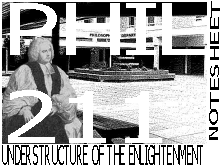 Kant 4
Kant 4 Kant 4
Kant 4The paradoxes of pre-Kantian Enlightenment thought are rooted in the following nostrums:
Kant's challenge is directed at the latter. He thinks the mind is active in forming the very foundation of experience.
According to the Lockean, 'collecting box', theory, perceptions just drop through the slot and into the mind. This analogy makes perceptions like coins - coins that can be sorted by the mind, but individual coins.
According to Kant there are no individual unsorted coins. What we experience are coins-as-categorised.
We might try to raise the question: what is reality like in itself? We may grant for the sake of argument that all our experience is structured by the conceptual scheme we bring to it, but want to go on to ask: but what is reality like when it is not being structured by our conceptual framework?
We may try to raise this question, but it follows from the Kant's claims about the framework that we can't sensibly raise it.
Kant's name for the world about which you can frame no thoughts at all is the noumenal world.
The world of which we can have experience is the world of 'phenomena', the world of experience, the phenomenal world.
In thinking about the self we have to apply causality.
The idea of the self being determined was repugnant to Kant.
You can see how his philosophy tries to allow the self a sort of escape route: the fact that the self is determined follows from our application of the concept of causality. But cannot we suggest the following: that the self independently of being thought about will not be subject to causality?
The self as it is in itself is called by Kant the noumenal self. And it is he says free. The difficulty is of course that we cannot, by his own principles, have this thought at all.
VP